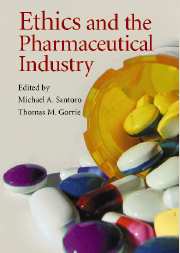Book contents
- Frontmatter
- Contents
- Tables
- Figures
- About the Editors
- Contributors
- Preface
- Acknowledgments
- Foreword
- Introduction: Charting a Sustainable Path for the Twenty-First Century Pharmaceutical Industry
- PART I PROFITS, PATIENTS' RIGHTS, AND SCIENTIFIC PROGRESS: THE ETHICS OF CLINICAL RESEARCH CONDUCTED IN PRIVATE ENTERPRISES
- Introduction to Part I
- 1 Drug Research: Between Ethical Demands and Economic Constraints
- 2 Emerging International Norms for Clinical Testing: Good Clinical Trial Practice
- 3 The Regulatory and Ethical Challenges of Pediatric Research
- 4 Including Children in Research: Participation or Exploitation?
- 5 Racial and Ethnic Inclusiveness in Clinical Trials
- 6 The Rights of Patients to Participate in Clinical Research
- 7 How Should Government Regulate Stem-Cell Research? Views from a Scientist-Legislator
- PART II MARKETING AND THE EFFICIENT UTILIZATION OF HEALTHCARE RESOURCES: ETHICAL AND PUBLIC POLICY CHALLENGES
- PART III PATENTS, PRICING, AND EQUAL ACCESS
- PART IV CONCLUDING THOUGHTS: CHARTING A SUSTAINABLE PATH FOR THE TWENTY-FIRST CENTURY
- Notes
- Index
1 - Drug Research: Between Ethical Demands and Economic Constraints
Published online by Cambridge University Press: 04 December 2009
- Frontmatter
- Contents
- Tables
- Figures
- About the Editors
- Contributors
- Preface
- Acknowledgments
- Foreword
- Introduction: Charting a Sustainable Path for the Twenty-First Century Pharmaceutical Industry
- PART I PROFITS, PATIENTS' RIGHTS, AND SCIENTIFIC PROGRESS: THE ETHICS OF CLINICAL RESEARCH CONDUCTED IN PRIVATE ENTERPRISES
- Introduction to Part I
- 1 Drug Research: Between Ethical Demands and Economic Constraints
- 2 Emerging International Norms for Clinical Testing: Good Clinical Trial Practice
- 3 The Regulatory and Ethical Challenges of Pediatric Research
- 4 Including Children in Research: Participation or Exploitation?
- 5 Racial and Ethnic Inclusiveness in Clinical Trials
- 6 The Rights of Patients to Participate in Clinical Research
- 7 How Should Government Regulate Stem-Cell Research? Views from a Scientist-Legislator
- PART II MARKETING AND THE EFFICIENT UTILIZATION OF HEALTHCARE RESOURCES: ETHICAL AND PUBLIC POLICY CHALLENGES
- PART III PATENTS, PRICING, AND EQUAL ACCESS
- PART IV CONCLUDING THOUGHTS: CHARTING A SUSTAINABLE PATH FOR THE TWENTY-FIRST CENTURY
- Notes
- Index
Summary
Any list of our civilization's achievements in the past would have to include the advances made in medicine. Within the field of medicine, drugs have always played a key role, either directly in the treatment of diseases or indirectly by creating the conditions under which other forms of treatment could be applied. Drug research has been a particularly successful field of activity. However highly it may be regarded in general, this does not mean that there are no grounds for criticism. Some critical questions relating to the code of ethics of drug research will be discussed below.
MEDICAL AND SCIENTIFIC ETHICS
The intellectual and ethical mindsets that have shaped the direction taken by drug research are motivated in two contrasting, yet related, ways: the first one is directed at curing diseases or at least alleviating their symptoms; the second one is scientific in nature and aims at the reliability and reproducibility of the process by which drugs are discovered and developed.
Drug therapy, and hence also drug research, are perceived as part and parcel of the medical – or more specifically of the doctor's – vocation. The declared goal of all drug research has always been to satisfy therapeutic needs. This goal goes hand in hand with the need for effective and safe drugs and for the careful assessment of the risk/benefit relationship in the therapeutic use of drugs, particularly when the relevant side effects of the drugs in question are known.
- Type
- Chapter
- Information
- Ethics and the Pharmaceutical Industry , pp. 21 - 36Publisher: Cambridge University PressPrint publication year: 2005
- 2
- Cited by

